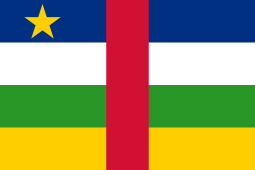Flag of the Central African Republic
 | |
| Use | |
|---|---|
| Proportion | 3:5 or 2:3 |
| Adopted | 1958 |
| Design | Four horizontal stripes of blue, white, green and yellow, and a single vertical band of red, with a yellow five pointed star in the upper left corner |
| Designed by | Barthélemy Boganda |
The national flag of the Central African Republic was created in 1958 by first president of Ubangi-Shari Barthélemy Boganda.[1]
Appearance[change | change source]
It has four horizontal stripes of blue, white, green and yellow, and a single vertical band of red, with a yellow five pointed star in the upper left corner.
Symbolism[change | change source]
The golden star is symbol of independence and bright future. The president Boganda announced that the colours of the four horizontal stripes represents four territories of French Equatorial Africa (Ubangi-Shari, Gabon, Congo and Chad), which he wanted to see united with maintaining relationship with France. The red stripe symbolizes blood, same for the every races and nations, in this case especially for the Africans The green color stands for forest areas, the yellow for savanna, blue for the sky. Other interpretation of the colours emphasizes national ideals, where the color blue symbolizes freedom, white – purity, green – hope, yellow – tolerance and hospitality, red – friendship and equality of every race and need of common respect.[1]
Construction sheet[change | change source]
The aspect ratio of the flag is 3:5 or 2:3.[1]
-
Construction sheet with ratio 2:3
-
Construction sheet with ratio 3:5
Historical flags[change | change source]
-
Flag proposition from 1976
-
Imperial Standard of Bokassa I during Central African Empire (1976–1979)
Related pages[change | change source]
- Coat of Arms of the Central African Republic
- La Renaissance, the national anthem of the Central African Republic




